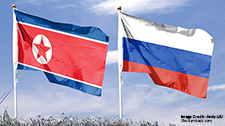Missiles and Reunions: Thaw or Freeze on the Korean Peninsula?
Victoria Pinson and Sangsoo Lee
Family reunions between North and South Korea may be an encouraging sign of a thaw in tensions on the Korean Peninsula, which could lead to further trust-building activities and economic cooperation. However, with missile tests and ongoing U.S.-South Korean military exercises, Pyongyang’s intentions in agreeing to family reunions are unlikely to extend to more significant issues, namely denuclearization, which remains the fundamental sticking-point to a substantial improvement in relations.
Related Publications
-
The Political Split at the Heart of Taiwan’s Struggle against Foreign Disinformation
Taiwan’s struggle against foreign disinformation and concerns about China’s impact on its 2024 election has received much international attention recently. This issue brief examines the domestic and international politics behind […]
-
ISDP Annual Report 2023
ISDP’s Annual Report for the year 2023. We look back on 2023, a year in which tensions and conflicts captured the strategic space in ISDP’s focus areas, making headlines around […]
-
What Comes Next for North Korea-Russia Relations?
North Korea and Russia have taken their relations to a new level after the leaders of the two countries held an in-person summit meeting on Wednesday. While Pyongyang and Moscow […]
-
Risk Reduction and Crisis Management on the Korean Peninsula
The situation on the Korean Peninsula is inherently intertwined with the growing instability of the East Asian security environment, where high tensions significantly increase the risk of unintended incidents and armed […]
-
Washington Declaration: Beyond Korea, What it Means for India?
In April 2023, South Korea and the United States released the Washington Declaration to reiterate and upgrade their treaty alliance. In outlining a joint nuclear deterrence strategy, the Declaration reaffirmed […]




